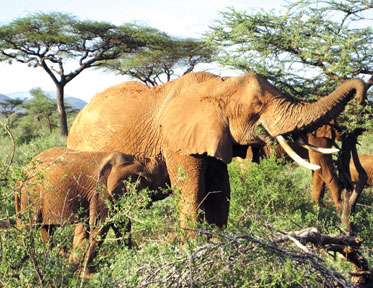Scientists discover why elephants' ancestors changed their diet
The change in feeding behaviour had been a scientific mystery, as it
occurred three million years before elephants evolved to have teeth
better-suited to eating grass
Scientists may have solved an evolutionary riddle of how the
ancestors of elephants changed their diet from soft leaves to relatively
tough grasses and in the process became one of the dominant herbivores
of the African savannah.
|

African elephants |
A study of the fossils of animals with tusks and trunks, such as
elephants and mammoths, has revealed that the crucial change in diet
occurred about three million years before elephants had actually
developed the big teeth needed for a grass diet. Professor Adrian Lister
of the Natural History Museum in London said that the fossils, which
cover a period of 20 million years, indicate that the ancestors of
today's elephants changed their feeding behaviour long before they
acquired the high-crowned teeth needed for chewing tough grasses.
A study, published in Nature, found that about eight million years
ago various species changed their diet and feeding behaviour by
switching from a diet based on browsing for leaves from trees to one
based on grazing the ground for grass.
Professor Lister said that the change - identified by analysing
carbon isotopes in the fossils - was relatively rapid and occurred at a
time when there were still plenty of trees and forests, indicating that
it was a behavioural "choice" rather than a necessity. Yet it took
another three million years for the elephants to evolve the high-crowned
teeth that were better suited to dealing with the grittier, grassy food.
"This long delay between the behavioural change and the evolutionary
response suggests that behaviour led the way and that it takes time for
complex changes in teeth and skulls to adapt to new lifestyles. After
that, the dental changes show a clear example of progressive evolution
for another four million years," Professor Lister said.
"The theory that behaviour may play an important role in the origin
of new adaptations has been discussed for over 100 years, but it has
been very difficult to find concrete examples. The idea is that, by
exploring a new habitat or trying a new food resources, species put
themselves in a situation where natural selection will modify their
anatomy to more efficiently accomplish the new behaviour," he said.
- The Independent
|


